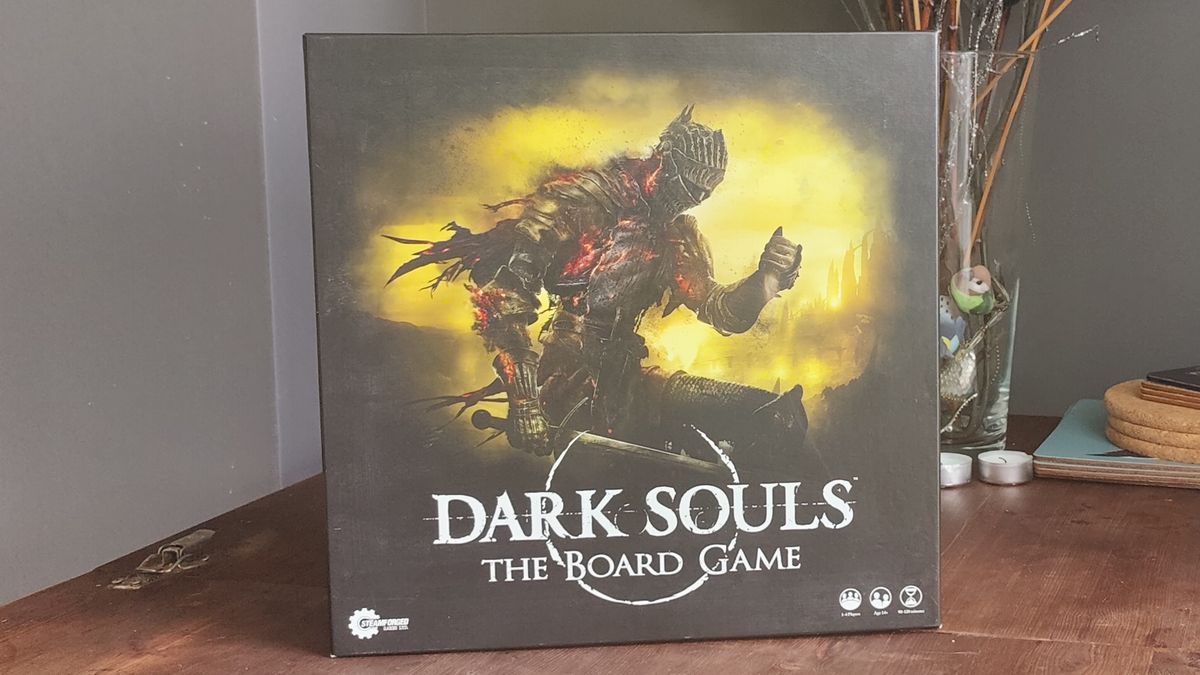12DOVE Verdict
Lady luck and some obtuse design choices marr what is otherwise a masterful recreation of the Dark Souls experience.
Pros
- +
Feels like Dark Souls
- +
Beautiful miniatures
- +
Rewarding tactical gameplay
Cons
- -
Luck plays too big a role
- -
Grindy
- -
Rules are hard to learn at first
Why you can trust 12DOVE
Praise the sun and get ready to die, because Dark Souls: The Board Game is here to teach you the true meaning of pain. And then once you’ve finished learning the rules, the game itself is pretty tough too.
Much like the video games series that it’s based on, Dark Souls: The Board Game takes no prisoners and holds no hands, which means it's certainly not going to be for everyone. But, if you’re the kind of person who enjoys the challenge of beating your head against a wall until the wall falls down (aka a Dark Souls fan) then this is one of the best board games for you.
Dark Souls: The Board Game - features
| Price | $99.99 / £99.99 |
| Ages | 14+ |
| Players | 1 - 4 |
| Lasts | 90-120+ mins |
| Complexity | High |
| Play if you enjoy | Nemesis, Dark Souls, sadomasochism |
Dark Souls: The Board Game is a co-operative, dungeon-crawling board game for adults that seeks to recreate the punishing experience of the Dark Souls video games. It’s a stunning collection to behold, for sure. The six included bosses, four player characters, and all the assorted minor enemies are beautifully imagined as plastic miniatures. There are also a host of tokens, player boards, health dials, and cards too.
How does it work?
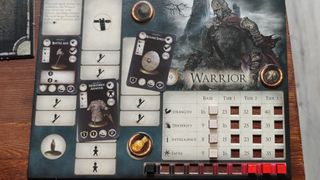
While Dark Souls is traditionally a solo affair, with the occasional interloper jumping in to help and/or murder you, Dark Souls: The Board Game is a co-operative venture, letting one to four players team up to tackle a dungeon and take on one of the series’ iconic boss monsters.
Yes, there is a one player mode, but to say that this is playing on hard mode is an understatement. You get more bonfire uses (aka respawns), but that’s all the assistance solo players have.
However, this isn't to say extra players will make it too easy. Increasing the player count means more health to go around, though it does also mean the monster will get more activations between each character’s turn. In other words, you can get stuck being wailed on for three turns if you don’t get backup from your teammates.
Once you get into the swing of things, it’s surprisingly breezy, but this only comes after you’ve deciphered the rules
Before you go anywhere though, you need to set up Dark Souls: The Board Game. This means laying out the dungeon, choosing a boss to fight, organizing the treasure decks, setting out tokens, etc. You also choose your characters from the roster of four - knight, warrior, assassin, and herald - each with their own specializations. It’s not a quick game to set-up, even if you know what you’re doing.
This is exacerbated by the hefty tome that makes up the rulebook. Your first game of Dark Souls is going to go slowly. Not because the game itself is overly complicated, but just because the rulebook is confusingly laid out. Once you get into the swing of things, it’s surprisingly breezy, but this only comes after you’ve deciphered the rules, which are almost entirely communicated by confusing symbols on the cards. We’d recommend watching a “how to play” video, like this great one by YouTube Channel Tabletop Duo.
Dark Souls: The Board Game - gameplay
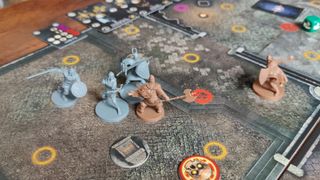
Once you do get past that initial learning curve, the turns fly by. The party enters rooms to start encounters, and these get tougher as you get closer to the boss room. In encounters, players and enemies take alternating turns moving around the combat arena via nodes, and each enemy has different behaviors that dictate where it will move and who it will attack. Archers move away from players and always shoot the player who last acted (the player is said to have 'aggro'), while melee enemies will typically move towards and attack the nearest player. Taking advantage of these rules is the key to victory, as is target priority and positioning.
It all feels very tactical and brutal - mistakes are quickly punished and even basic enemies can deal huge chunks of damage in one attack. This harsh but fair approach to difficulty feels very Dark Souls-y.
Dark Souls really comes to life as you and your friends dance around the arena, trying to maximize your damage output while avoiding getting trampled to death
What doesn't feel very Dark Souls-y is how reliant on luck a lot of this game's mechanics are. Attacking enemies, blocking attacks, and dodge-rolling are all dice-based challenges, and while you can tip the dice in your favor by playing to your strengths, you will be betrayed by the dice at some point and get slapped through no fault of your own.
This luck factor also extends to the gear you 'find'. After each encounter, you can return to the bonfire and spend a soul to buy a random card from the gargantuan treasure deck. Most of these treasures need you to have upgraded your skills before you can use them - something which also costs souls. The problem is that there is no sense of progression in the treasures you get. You might get a sword you can use with a single stat upgrade, or a massive broadsword that requires a top level strength stat.
Some rare and legendary treasures are kept out of the deck, but it would be better if there was some way to guarantee you’re getting level-appropriate gear for your party. As it is, you can play for hours and have most of the party still using their starting gear because the deck didn’t throw out anything good for their class, or because you had to sink all your souls into one player so they could use the super mega sword of destiny that you found.
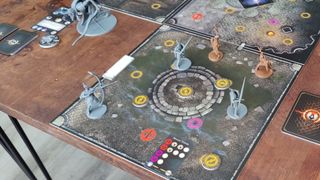
That’s where the grinding comes in. Bonfires can be used as a lives system of sorts, letting the party respawn after a failed run (and all the souls you had saved up get left in the room you died in), but in practice, I found that bonfires are mainly there to facilitate grind. You can use them voluntarily to reset all the encounters, so you can grind them for souls again. This is one part of the real Dark Souls experience that should have been left behind in the transition to the tabletop.
None of my complaints are deal-breakers, but it seems like unforced error when you could just have multiple tiers of treasure decks and let players choose where they take treasure from.
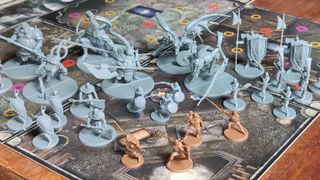
Developer Steamforged Games seems to know that things aren't as balanced as they could be, to its credit; it recently released two standalone Dark Souls expansions with updated core rules that seek to fix some of these issues. These rules are even backwards compatible with the main game and other expansions, too. I’ll be checking those out soon, but since you need to buy them to get ahold of those new rules, it seemed fairer to judge Dark Souls: The Board Game on its own merits.
Still, when you have eventually finished grinding away in the dungeons and you want to go tackle the big boss monster, that’s when the Dark Souls board game really gits gud.
Boss monsters have their own separate arenas (on the other side of a fog door, nice) and their fights are quite different to standard enemies. Since you’d get pounded into mush if the Titanite Demon ran straight at you in this game, boss' attacks are instead dictated by their own unique attack cards. Each time the boss attacks, it draws a card from its deck and moves/attacks in the pattern shown. Importantly, the order of the boss’ deck doesn’t change though, so if you’re paying attention you can learn its attack patterns and know where not to be in subsequent turns (just like its video game counterpart).
This is where Dark Souls really comes to life, as you and your friends dance around the arena, trying to maximize your damage output while avoiding getting trampled to death. Oh, and as a final Dark Soulsian kick to the undercarriage, the boss’ attack pattern changes when it gets low on health.
Defeat the boss and the spoils are yours. From there, you can rerack, add some spicier cards to the treasure and encounter decks, and go again. You can even string a load of games together into a campaign if you want to.
Should you buy Dark Souls: The Board Game?
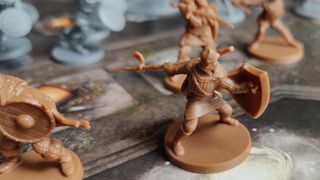
Ultimately, Dark Souls: The Board Game’s strengths outweigh its weaknesses. The brutal, tactical gameplay means that every decision feels like it matters, and landing that final blow on the Titanite Demon just before he’s about to Electric Breath your party off the board is an intoxicating feeling.
It’s not flawless though. It’s a pain to learn the rules to begin with thanks to the abstract and needlessly vague symbology. Luck also plays too large a factor for a game this punishing. Plus, you can find yourself grinding away for hours redoing the same fights over and over trying to get better gear - accurate to the game, but repetitive in a board game.
Buy it if...
You want a more challenging dungeon-crawler
The brutal, tactical gameplay of the Dark Souls board game offers plenty for you to get your teeth into. It's tough but fair.
You're a big From Software fan
Those who've spent hundreds of hours in the Souls series (and its follow-ups) will find a lot to love here; for better or worse, it feels very true to the video games.
Don't buy it if...
You dislike games that rely on luck
The game's reliance on luck can be frustrating, and it undermines your strategies with unwelcome randomness.
You don't like grindy gameplay
If you aren't a fan of repetitive levelling-up mechanics, you may want to avoid this one.
How we tested Dark Souls: The Board game
I played through multiple sessions of the Dark Souls board game over a number of months to get a good feel for its mechanics, monsters, and different classes. Yes, there was a lot of dying.
You can find out more about the process by checking how we test products.
For more recommendations, check in with these must-have board games for 2 players, essential cooperative board games, and the top Star Wars board games.

Ian Stokes is an experienced writer and journalist. You'll see his words on 12DOVE from time to time, and he works as Entertainment Editor at our sister site Space.com.

Former Nintendo marketing leads say the Wii U flopped so bad that getting third-party support on Switch was "really hard," but the Switch 2 marks a new era: "There's no more proving yourself"
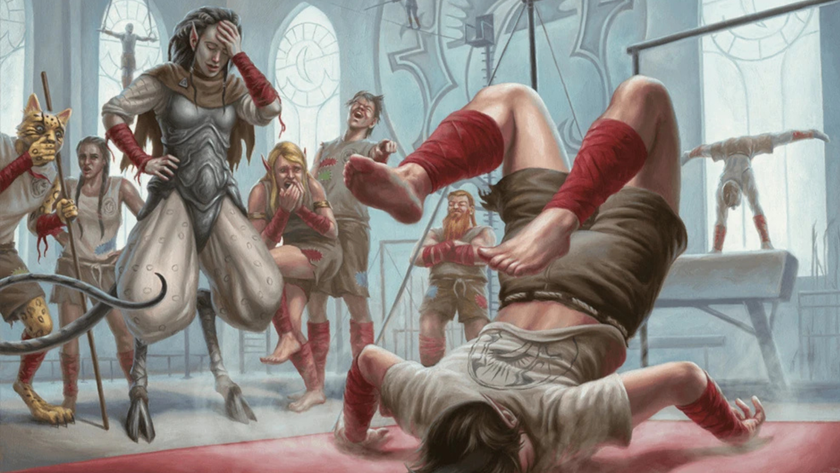
The Baldur's Gate 3-themed Stardew Valley mod that Larian boss Swen Vincke called "amazing" gets DMCA'd by D&D publisher Wizards of the Coast
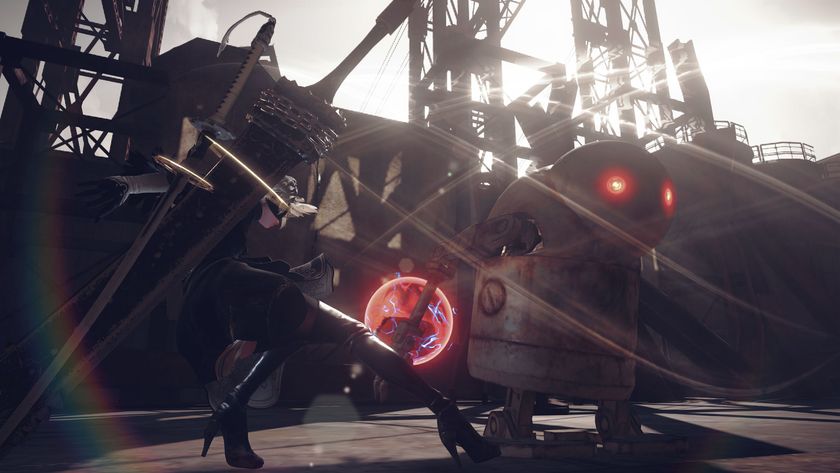
After PlayStation boss praises Nier Automata as a savior for Japanese games overseas, Yoko Taro says he was specifically told to focus on Japan because it wouldn't fly overseas
